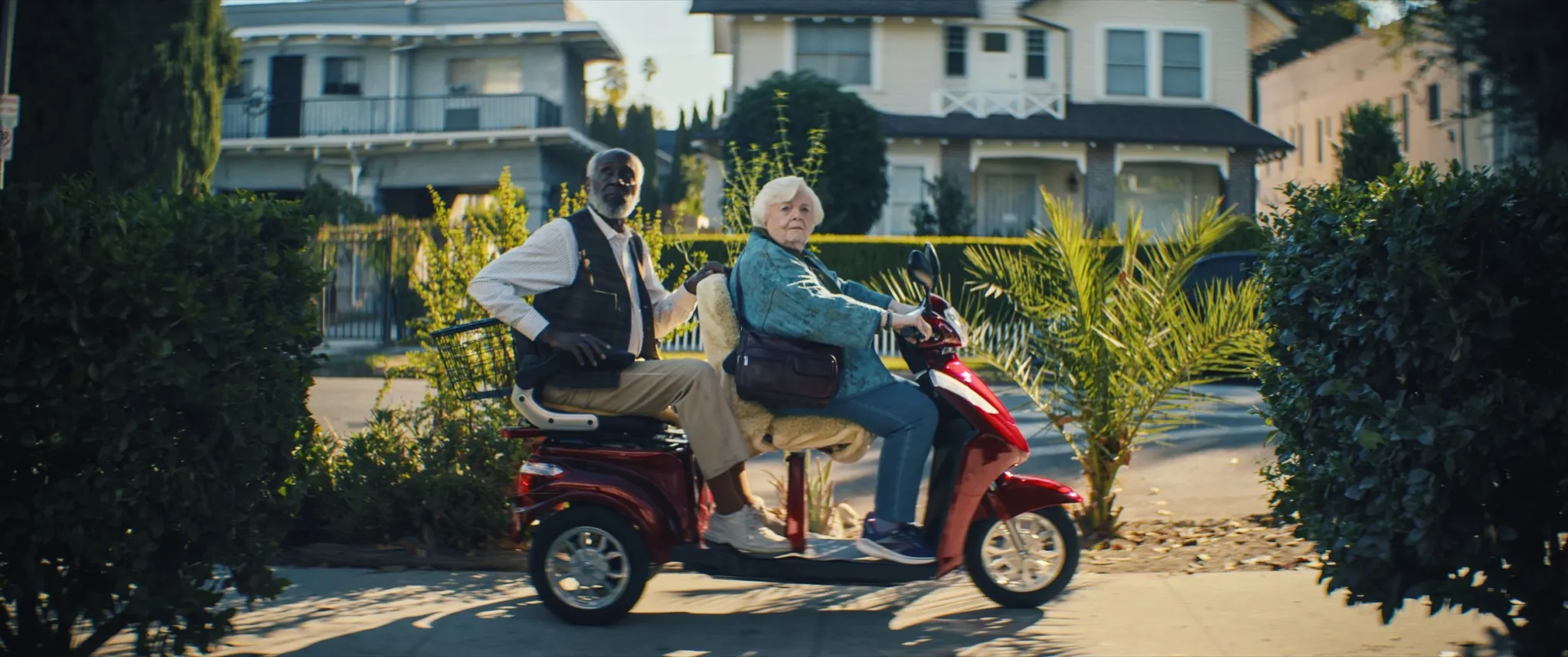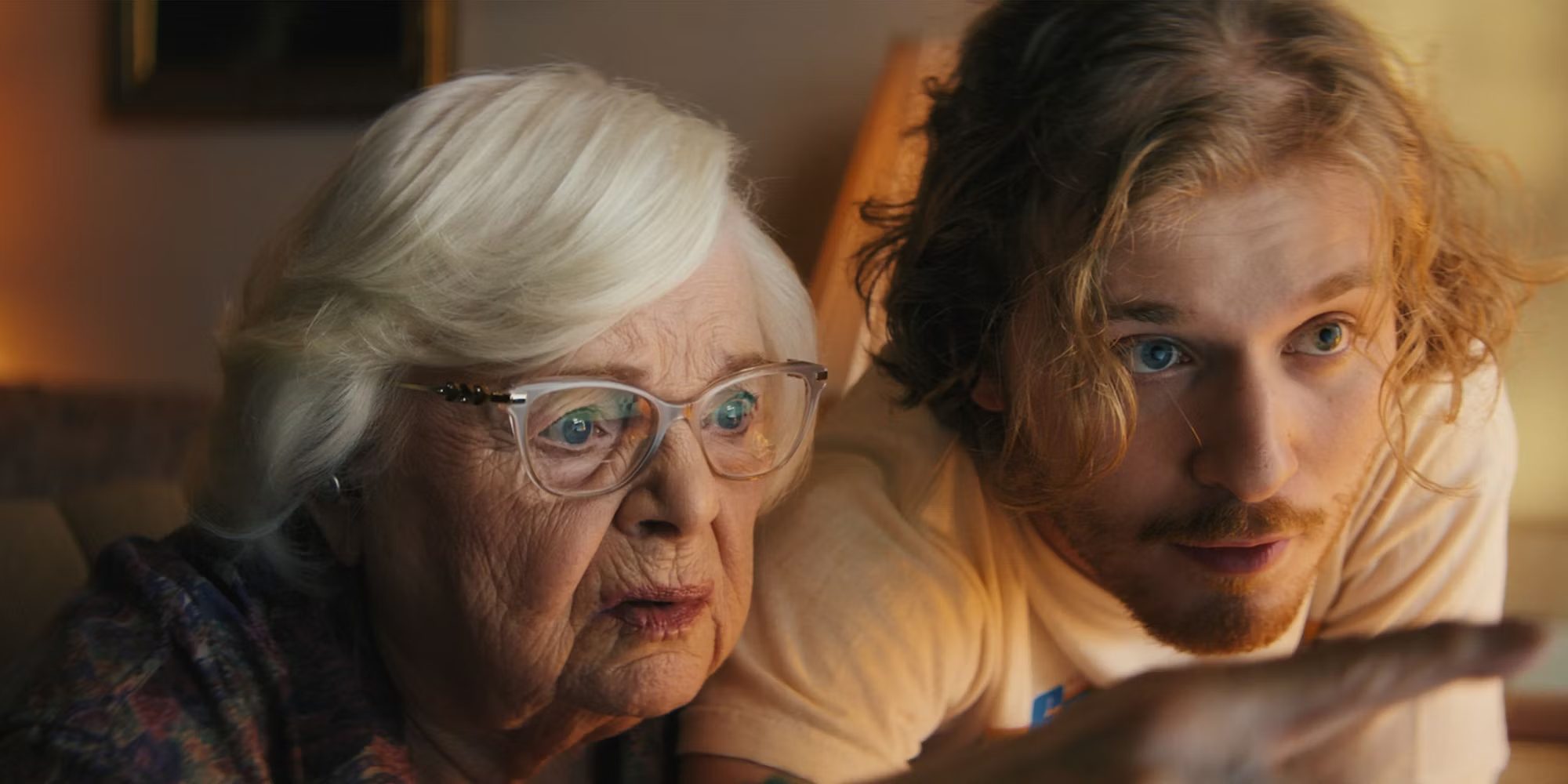Thelma is one of those “we ain’t dead yet” movies. You know the type. It stars a septuagenarian or an octagenarian in the lead role in a kind of film usually led by the hottest du jour.
Written and directed by Josh Margolin, Thelma gives June Squibb her first leading role as Thelma. A woman who gets scammed out of ten thousand dollars by people pretending to be her grandson. Margolin’s script is clever in that it feints at having a plot but instead indulges in its story. The plot, on the surface, is remarkably similar to the David Ayer, Jason Statham vehicle The Beekeeper, an action pack screed that fed on our desire to see phone scammers get their just desserts.

However, Margolin is working with a considerably older lead character than Ayer, though Squibb did all her own stunts. Still, what drives Thelma is the story, not the plot. The way Margolin approaches every character with a kind eye. It’s not a tongue-in-cheek action movie with older people like say Reds, but is instead something much sweeter and sentimental.
Throughout Thelma, Squibb’s character is confronted by the fact that many of her friends are dead, and despite her gumption, she may find herself in a retirement home sooner than she’d like. Her old friend Ben, played by legendary Richard Roundtree, lives in one and seems happy and fulfilled. The two of them together spend the movie carousing around the Valley in Ben’s brand new ruby red motorized scooter.
Margolin cleverly constructs the plot of Thelma in a way that allows the characters to be constantly on the move. But also in a way that sometimes feels like the plot is an afterthought to the characters themselves. Thelma being scammed is embarrassing for her but her livelihood isn’t threatened. More than anything Thelma wants her money back because it’s hers and she wants to do it on her terms.
A lot of Thelma deals with characters struggling either to accept help or gain some acreage of independence. Far from cynical, there’s an undercurrent of profundity in Thelma as it struggles with the complexities of when to accept help and when to go it alone.
The best example of this is during one of the many arguments between Thelma and Ben as they traverse the L.A. landscape. Ben asks Thelma why she’s so afraid to let people help her. “I lived with my parents until I was 26. Then I married and moved in with Teddy until I was 96. I’ve been on my own for two years. I guess, I hoped I got to be on my own for a little longer.”
It’s a sweet moment and in Squibb’s hands, turns into a quiet moment of truth about women of a certain generation. She doesn’t regret marrying her husband, and she misses him dearly, but this newfound privacy and independence is something altogether new and precious to her. She doesn’t want to give it up so easily.
Besides, Thelma isn’t alone. She has her grandson Danny (Fred Hechinger) who visits her often. Danny and Thelma have a loving relationship built on mutual respect for each other. They talk to each other in a way they can’t talk to say Thelma’s daughter Gail (Parker Posey) and her husband Alan (Clark Gregg). The duo mean well but Thelma and Danny often give each other knowing looks that act as whole conversations while they listen to Gail and Alan lecture them. The two share a mischievous and tender camaraderie.

Thelma frames the act of the scammers calling in a way that makes us understand how Thelma could fall for it. They tell her Danny’s been in an accident, and he needs money now. Thelma tries to call Danny, Gail, and Alan but they don’t answer their phones.
Margolin approaching his characters with a kind heart means he doesn’t try and make them look silly and stupid. We understand why and how Thelma sent the money. He also shows how people from every generation fall for scams.
In addition, he allows them moments of vulnerability. Hechinger’s Alan is overwhelmed and at his wit’s end. His parents constantly asking how he’s doing and checking up on him makes him feel like he can’t do anything right. Alan’s also trying to find a job and is dealing with feelings. Inadequacies.
As someone job hunting himself, his fears and anxieties ring all too true. It’s no longer enough to be merely a good worker. Companies are no longer interested in your abilities as much as your qualifications.
For a movie about old people, Margolin doesn’t poke fun at them. Instead, he finds them bemusing. My favorite is the running gag of Thelma seeing a stranger and saying, “I think I know her” and having the two people begin to tunnel through their family tree and friend groups trying to find a connection. Only to realize they don’t know each other and part with a smile and shrug.
Margolin avoids the grumpy old people stereotype. Though, he does have some fun with it. “You left your grandson in the car?!” “Well, he’s 24!” Though if there is a grumpy old man it’s Ben. Roundtree’s Ben is the mirror opposite of Thelma. A widow himself, he likes living in the home. Likes being active but also likes having his routine. The two push and pull each other in the way, but he’s not grumpy so much as particular.
There’s a scene early on where Margolin and David Bolen’s camera captures Roundtree’s face in a close-up. It’s a revelation of a moment to see the original Shaft at 81 and still as charming and magnetic as he ever was. Roundtree hasn’t lost a step and he’s the film’s secret weapon.
He gives Squibb someone to play off of. Someone to talk to. Roundtree may be an icon of Blaxploitation but the man has a great gift of being present. He knows how to act and listen, and it’s vital to so much of Thelma.
One of the great surprises is how shrewd Thelma is about people over the age of 80. “We’re old. Diminished. The least we can do is take care of each other.” A line that grows in resonance as Thelma and Ben get closer and closer to finding the location of the scammers.
Located in the back of a lamp and light fixture store sits Malcolm McDowell with an oxygen tank looking tired and defeated. Unlike Ayer’s The Beekeeper, Margolin recognizes the cruelty of the system is not merely the way the powerful exploit it but how it forces us to exploit each other. McDowell’s Harvey is a jerk. But like so many of the characters we’ve met in Thelma he is someone that has been discarded or ignored because he’s committed the crime of growing old in an uncaring and viciously greedy nation.
Thelma seems like it’s going to be an eccentric action movie with older leads. It reveals itself to be a touching serene exploration of how vital community and self-reliance are; and how often they can work together. At the heart of it is Squibb’s redoubtable Thelma, stubborn, resilient, and here. It’s not death she’s afraid of, it’s the loss of her identity.
Images courtesy of Magnolia Pictures
Have strong thoughts about this piece you need to share? Or maybe there’s something else on your mind you’re wanting to talk about with fellow Fandomentals? Head on over to our Community server to join in the conversation!

